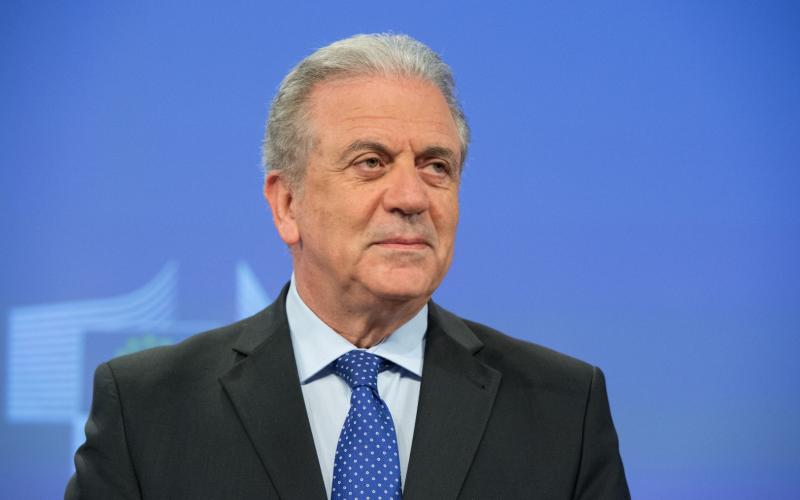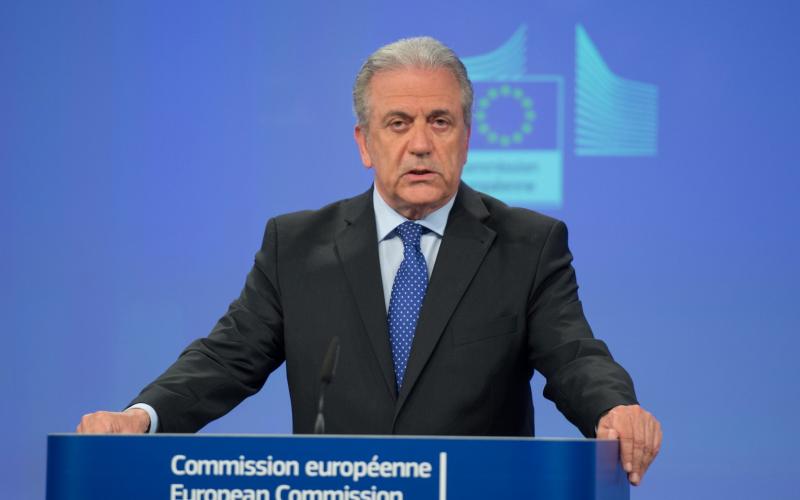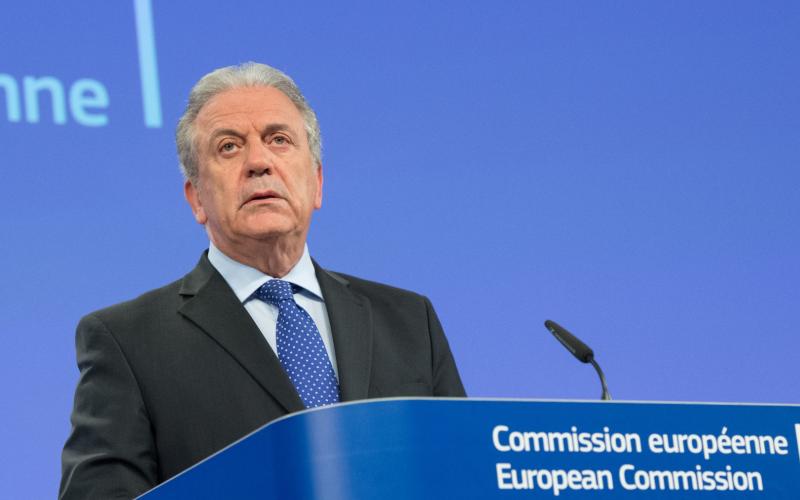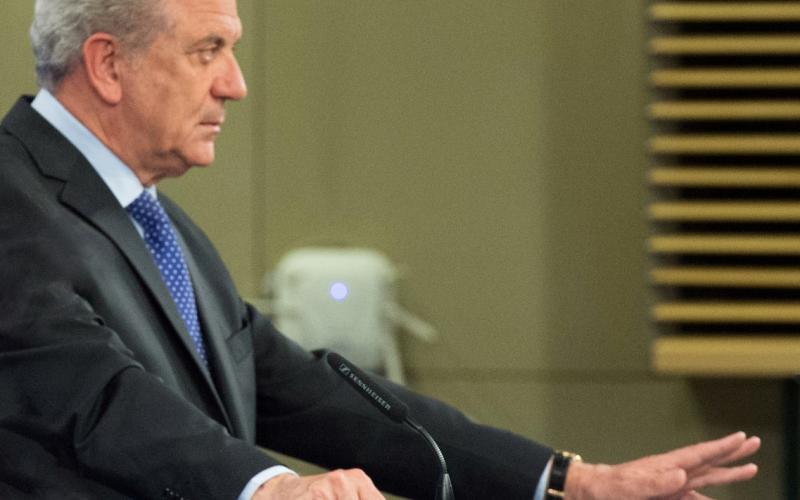Thank you Frans.
Dear all, good afternoon.
Let me just say that today is really an important day because we finally present our legislative proposal to ambitiously reform Dublin.
This is something that I have been calling for already during my hearing before being appointed European Commissioner one and a half years ago.
Today we finally take a step forward towards a fairer and more equitable asylum system for all Member States, by building the concept of solidarity and responsibility, sharing into the foundations of the system.
I take this opportunity to remind you all that when we talk about solidarity and responsibility, we do not refer to moral principles, but also to legal ones, since they are explicitly stipulated in the text of the treaties. So it is the moment for all of us, the Member States, the Commission of course, to prove what we really mean when we talk about these two principles.
And this is not only valid for Dublin, which is only one element of our wider reform of the Common European Asylum System.
Today we also propose to reform Eurodac and to turn the European Asylum Support Office into a genuine EU Agency for Asylum.
With the new Eurodac system, Member States will be able to store and search fingerprints for all third-country nationals who apply for asylum, who are stateless or are found to be staying irregularly within the European Union.
That way, Eurodac can be directly used for facilitating readmission and return operations.
Pooling data not just on fingerprints, but also names, dates of births, nationalities and travel documents will allow immigration officials to request information with just one click.
Our asylum system can only work with a stronger agency.
Just like we turned Frontex into a European Border and Coast Guard, we propose to turn the European Asylum Support Office into a fully-fledged European Union Agency for Asylum with a stronger mandate and more operational tasks in order to offer more support.
The new Agency will operationalise the fairness mechanism of the new Dublin system.
Everything will be centralised, transparent and objective.
We will also equip the new Agency financially and operationally with more resources.
We want the new Agency to dispose of a reserve pool of a minimum of 500 experts from Member States, so it can deploy asylum support teams rapidly when a Member States is suddenly facing disproportionate migratory pressure.
Speaking of migratory pressure – this brings me to the other point we discussed today in College: Schengen and temporary internal border controls.
As you know, and as I have also said many times, our objective is to return to a normalisation of Schengen with no internal border controls as soon as possible. But in order to take that step forward in safeguarding Schengen, we need to take some intermediate steps.
As we still face deficiencies at our external borders, we need to take temporary steps to allow for the exceptional continuation of existing controls at certain internal borders of the European Union.
Let me first acknowledge that Greece has made significant progress in the last few months and weeks.
However, not all of the serious deficiencies identified could be adequately and comprehensively addressed within the three months' limit that was set in line with the Schengen Borders Code.
With the large numbers of asylum seekers still in Greece, but some also along the Western Balkan route, we still face a risk of secondary movements.
As a result, we propose that the Council recommends that Austria, Germany, Sweden, Denmark and Norway maintain the internal border controls at specific border crossing points for up to six months.
We do not propose the introduction of border controls at the Schengen borders of Greece, namely at airports and ports.
Let me reiterate that our proposal should be seen as an exceptional temporary measure to ultimately allow for the safeguarding and return to a normal functioning Schengen area as soon as possible.
Finally, in the College today we adopted two proposals for visa liberalisation.
For Turkey, our report and proposal are very clear:
The Turkish authorities have made remarkable progress since the 18th of March, the EU-Turkey Summit, but there is still work to be done.
Our proposal is based on the understanding that all benchmarks have to be met as a matter of urgency.
The fulfilment and implementation of these benchmarks will bring closer our legal and political systems, and help enhance our cooperation in the field of operations.
But today I am also very pleased to propose visa liberalisation for Kosovo.
We propose visa liberalisation on the understanding that the ratification of the border agreement with Montenegro and the further strengthening of the track record in the fight against organised crime and corruption will be confirmed before adoption of the proposal by the European Parliament and Council.
Today's report and proposal are the results of the hard work and successful efforts of the Kosovo authorities in achieving far-reaching and difficult reforms in the Justice and Home Affairs area and beyond.
Of course, we will continue to monitor this further progress very closely.
I know how important visa-free travel is for the citizens of Kosovo and I am very glad to be able to present this proposal today.
I hope that the European Parliament and the Council will adopt our proposal very soon.
Let me be clear: visa liberalisation does not mean uncontrolled entry into the European Union.
Only people who have biometric passports can enter.
Moreover, these visa liberalisation efforts should also be seen as part of our wider approach to migration, security and borders.
Recently, we tabled a very important proposal for an Entry Exit System which will allow for a solid tracking of all third country nationals crossing our external borders and in particular over-stayers.
The European Parliament and Council should speed up work to get it adopted.
In autumn, I will present a proposal for an EU Travel Information and Authorisation System, the equivalent of the ESTA system in the United States, so visa-exempt travellers will register relevant information regarding their intended stay in the EU.
In this context, equally important is our amendment to the visa suspension mechanism, as Frans explained already.
Today is an important day: internally, when it comes to reforming our asylum systems and managing our internal borders, and externally when it comes to our proposals for visa liberalisation for Turkey and Kosovo.
Today we take concrete steps towards a more integrated and coordinated migration, mobility and border policy in the European Union. Thank you for your attention.







